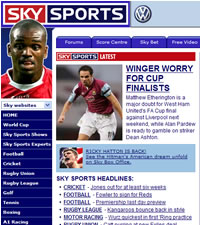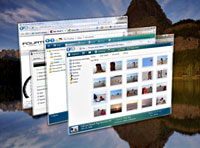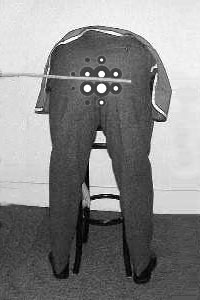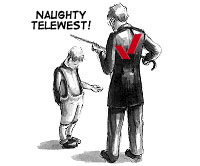 EFF-fans and electronic freedom groupies have a new poster boy who comes from an unlikely profession. They’re normally attracted to open-source code-a-holics, or white hat hacker, but this one’s a judge.
EFF-fans and electronic freedom groupies have a new poster boy who comes from an unlikely profession. They’re normally attracted to open-source code-a-holics, or white hat hacker, but this one’s a judge.
On Friday, Judge Harry Edwards tore a few strips off the associate general counsel, Jacob Lewis, representing the Federal Communications Commission (FCC). He was one of three judges at a hearing of the federal appeals court, investigating whether the US government have the same right to tap VoIP phone conversations as they currently have with ‘normal’ phone lines.
The quotes that Reuters are reporting are pretty choice. In a response to hearing their arguments, he replied, “This is totally ridiculous. I can’t believe you’re making this argument.”
He didn’t stop there, later letting them have it with both barrels.
“Your argument makes no sense,” Edwards told Jacob Lewis, an associate general counsel with the FCC.
“I’m sorry I’m not making myself clear,” Lewis said.
“You’re making yourself very clear. That’s the problem,” Edwards replied.
Wow, that is cutting.
 The ride wasn’t so rough from the other two judges, with the second, David Sentelle, appearing to side with the FCC, especially for Internet phone services. The last, Janice Brown kept her thoughts to herself.
The ride wasn’t so rough from the other two judges, with the second, David Sentelle, appearing to side with the FCC, especially for Internet phone services. The last, Janice Brown kept her thoughts to herself.
We await the T-shirts flooding the market.
 As is now part of computer-lore, Apple Computers were called so because of the founders loves of the Beatles and their record label, Apple Corps.
As is now part of computer-lore, Apple Computers were called so because of the founders loves of the Beatles and their record label, Apple Corps. Latterly Apple Corps, with some justification, felt that Apple Computers had now entered the music business, through their iPod players and iTunes music store, so they brought legal action again.
Latterly Apple Corps, with some justification, felt that Apple Computers had now entered the music business, through their iPod players and iTunes music store, so they brought legal action again. What drove the legal action?
What drove the legal action? A quick catchup. We’ve been covering the
A quick catchup. We’ve been covering the  In 1998 A Bug’s Life came along also bringing $362m in worldwide ticket sales, 1999 saw Toy Story 2 ($485m). The following years saw Monsters Inc, Finding Nemo, The Incredibles all do very well, sealing Pixar as _the_ CG animation stuido.
In 1998 A Bug’s Life came along also bringing $362m in worldwide ticket sales, 1999 saw Toy Story 2 ($485m). The following years saw Monsters Inc, Finding Nemo, The Incredibles all do very well, sealing Pixar as _the_ CG animation stuido. She’s got a mission to eliminate mobile phone roaming rip-off charges. She’s Commissioner Viviane Redding of the EC, and today, Vodafone took PR action to keep itself out of her sights, by promising to “cut roaming by 40%” by this time next year.
She’s got a mission to eliminate mobile phone roaming rip-off charges. She’s Commissioner Viviane Redding of the EC, and today, Vodafone took PR action to keep itself out of her sights, by promising to “cut roaming by 40%” by this time next year. But like many of the giants, Vodafone is suffering from the cost of providing phones. All the European operators, traditionally, subsidise handsets; they give them away, or sell them for a fraction of their cost, in the expectation of making substantially more out of phone call charges – and it works.
But like many of the giants, Vodafone is suffering from the cost of providing phones. All the European operators, traditionally, subsidise handsets; they give them away, or sell them for a fraction of their cost, in the expectation of making substantially more out of phone call charges – and it works. There had been some excitement, well amongst UK media analysts at least, that BSkyB might loose its dominance of the control of UK football’s Premier League.
There had been some excitement, well amongst UK media analysts at least, that BSkyB might loose its dominance of the control of UK football’s Premier League. Finally the other company, Irish broadcaster Setanta, had thrown its hat into the ring, originally saying they were going to bid for two of the packages. Those not in the broadcast world wouldn’t necessarily know who Setanta are, but most people will know of their 40% owners, Benchmark Capital.
Finally the other company, Irish broadcaster Setanta, had thrown its hat into the ring, originally saying they were going to bid for two of the packages. Those not in the broadcast world wouldn’t necessarily know who Setanta are, but most people will know of their 40% owners, Benchmark Capital. JupiterResearch have released research that indicates that 53 percent of Digital Video Recorder (DVR)/PVR users in America have used their DVRs to skip commercials.
JupiterResearch have released research that indicates that 53 percent of Digital Video Recorder (DVR)/PVR users in America have used their DVRs to skip commercials. Now where we’re united with Jupiter is that people watch more TV when they’ve got a DVR. That is the experience of the vast majority of PVR/DVR users.
Now where we’re united with Jupiter is that people watch more TV when they’ve got a DVR. That is the experience of the vast majority of PVR/DVR users. This weekend marks the start of Vodafone UK offering live coverage of international cricket and the Football League Playoffs from Sky Sports to their 3G customers.
This weekend marks the start of Vodafone UK offering live coverage of international cricket and the Football League Playoffs from Sky Sports to their 3G customers. Bizarrely, Sky specify that the content is for Personal use only. Errr … it’s on a mobile phone Sky. It’s not like you’re going to get the throngs in the pub crowding around watching it on a tiny screen. That is until someone comes up with a huge magnifying glass that the phone sits behind.
Bizarrely, Sky specify that the content is for Personal use only. Errr … it’s on a mobile phone Sky. It’s not like you’re going to get the throngs in the pub crowding around watching it on a tiny screen. That is until someone comes up with a huge magnifying glass that the phone sits behind. Last year took ourselves to Berlin to attend IFA. Being the first time we’d attended we were _totally_ blow away at the size of the place – it’s massive. Every side of the Consumer Electronics (CE) industry was covered, from the smallest to the largest with the later building their own houses (Siemens, Deutsche Telekom).
Last year took ourselves to Berlin to attend IFA. Being the first time we’d attended we were _totally_ blow away at the size of the place – it’s massive. Every side of the Consumer Electronics (CE) industry was covered, from the smallest to the largest with the later building their own houses (Siemens, Deutsche Telekom). Asked why IFA was so loved by trade visitors, his answer was simple, “We treat them as VIP’s. Nothing is too much and they feel very special.” Sounds like a recipe for success to us, one that could easily be learned by many other shows around the world.
Asked why IFA was so loved by trade visitors, his answer was simple, “We treat them as VIP’s. Nothing is too much and they feel very special.” Sounds like a recipe for success to us, one that could easily be learned by many other shows around the world. Research firm Gartner has said that it expects Vista, Microsoft’s major Windows upgrade, to not appear until the second quarter of next year.
Research firm Gartner has said that it expects Vista, Microsoft’s major Windows upgrade, to not appear until the second quarter of next year. Microsoft’s current plans involve releasing Vista to manufacturing in October/November 2006 and making it available to enterprises through volume licenses by the end of this year, with the OS becoming available to computer manufacturers for shipping in January, 2007.
Microsoft’s current plans involve releasing Vista to manufacturing in October/November 2006 and making it available to enterprises through volume licenses by the end of this year, with the OS becoming available to computer manufacturers for shipping in January, 2007. “Respectfully disagreeing” with Gartner’s view, the spokesperson said that that finished Windows Vista would ship in November and January with a second beta ready to roll in the second quarter of this year.
“Respectfully disagreeing” with Gartner’s view, the spokesperson said that that finished Windows Vista would ship in November and January with a second beta ready to roll in the second quarter of this year. Broadband giants Telewest have had to bend over and feel the sharp swish of the Advertising Standards Agency’s corrective ruler on their ample rumps after their broadband radio advert was deemed ‘misleading.’
Broadband giants Telewest have had to bend over and feel the sharp swish of the Advertising Standards Agency’s corrective ruler on their ample rumps after their broadband radio advert was deemed ‘misleading.’ A Telewest customer – clearly already living in a Telewest area – liked the sound of the deal so much they rang up to sign on, only to find that they were clearly in the wrong sort of ‘Telewest area.’
A Telewest customer – clearly already living in a Telewest area – liked the sound of the deal so much they rang up to sign on, only to find that they were clearly in the wrong sort of ‘Telewest area.’ The ASA concluded, “We considered this important restriction should have been explained in the ad and that “Conditions apply” had not been adequate to cover such a significant condition to the offer. The ad breached CAP (Broadcast) Radio Advertising Standards Code section 2, rule 3.”
The ASA concluded, “We considered this important restriction should have been explained in the ad and that “Conditions apply” had not been adequate to cover such a significant condition to the offer. The ad breached CAP (Broadcast) Radio Advertising Standards Code section 2, rule 3.”